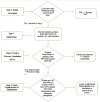Enhancing neonatal resuscitation outcomes: bridging theory and practice
- PMID: 40102330
- PMCID: PMC11920338
- DOI: 10.1007/s00431-025-06087-8
Enhancing neonatal resuscitation outcomes: bridging theory and practice
Abstract
Neonatal resuscitation practices have undergone tremendous changes over the past two decades, with progress accelerating due to advances in medical technology, scientific research, and improvements in clinical practices. Among other global frameworks, the neonatal resuscitation program has been periodically updated to incorporate evidence-based interventions aimed at improving survival rates, reducing morbidity and enhancing long-term health outcomes for newborns. This review traces the historical development of neonatal resuscitation guidelines from the early days' resuscitation practices of the mid-twentieth century to the present day. It narrates how clinical needs, emerging technologies, and scientific discoveries have shaped the evolution of these guidelines and practices. By reviewing recent guidelines, such as those issued by the American Heart Association and the World Health Organization, this article sheds light on the current core principles of neonatal resuscitation, including effective airway management, appropriate ventilation techniques, and the critical importance of timely intervention. The major determinants of changes in guidelines, as identified through this review, include advancements in scientific research, expert opinion, and international collaboration. Challenges in implementing these guidelines, particularly in low-resource settings, are discussed, along with case studies that demonstrate the impact of updated practices in real-world clinical environments.
Conclusion: The review concludes with a reflection on the continued need for research to close remaining gaps and enhance neonatal resuscitation practices across diverse global contexts.
What is known: • Effective neonatal resuscitation significantly improves outcomes by reducing neonatal mortality and morbidity. • Neonatal resuscitation program provides standardized protocols to implement these resuscitation skills.
What is new: • Simulation-based training and real-time feedback can bridge the gap between theoretical guidelines and practical application. • Despite advances in knowledge and application of these guidelines, challenges persist, such as regional differences, lack of resources in lower-income countries, and ideal ventilation devices and oxygenation methods.
Keywords: Airway management; Clinical trials; Global variation; Guidelines; Low-resource settings; Medical advances; Neonatal care; Neonatal resuscitation program.
© 2025. The Author(s).
Conflict of interest statement
Declarations. Competing interests: The authors declare no competing interests.
Figures
Similar articles
-
The future of Cochrane Neonatal.Early Hum Dev. 2020 Nov;150:105191. doi: 10.1016/j.earlhumdev.2020.105191. Epub 2020 Sep 12. Early Hum Dev. 2020. PMID: 33036834
-
Effectiveness of Neonatal Resuscitation Training Programs, Implementation, and Scale-Up in Low- and Middle-Income Countries.Neonatology. 2025;122(Suppl 1):52-83. doi: 10.1159/000542539. Epub 2024 Nov 22. Neonatology. 2025. PMID: 39581184 Free PMC article.
-
The International Liaison Committee on Resuscitation (ILCOR) consensus on science with treatment recommendations for pediatric and neonatal patients: pediatric basic and advanced life support.Pediatrics. 2006 May;117(5):e955-77. doi: 10.1542/peds.2006-0206. Epub 2006 Apr 17. Pediatrics. 2006. PMID: 16618790
-
Student and educator experiences of maternal-child simulation-based learning: a systematic review of qualitative evidence protocol.JBI Database System Rev Implement Rep. 2015 Jan;13(1):14-26. doi: 10.11124/jbisrir-2015-1694. JBI Database System Rev Implement Rep. 2015. PMID: 26447004
-
Revolutionizing Neonatal Care: A Comprehensive Review of Intact Cord Resuscitation in Newborns.Cureus. 2024 Sep 8;16(9):e68924. doi: 10.7759/cureus.68924. eCollection 2024 Sep. Cureus. 2024. PMID: 39381456 Free PMC article. Review.
References
-
- World Health Organization (WHO) (2024) Perinatal asphyxia. Available at: https://www.who.int/teams/maternal-newborn-child-adolescent-health-and-a.... Accessed 20 Dec 2024
-
- Aziz K, Henry C, Escobedo MB, Hoover AV, Kamath-Rayne BD, Kapadia VS et al (2021) Part 5: neonatal resuscitation 2020 American Heart Association guidelines for cardiopulmonary resuscitation and emergency cardiovascular care. Pediatrics 147(Supplement 1). 10.1542/peds.2020-038505E - PubMed
-
- American Academy of Pediatrics (AAP) (2024) Delayed cord clamping in preterm infants: is it time to become standard practice? Available at: https://www.aap.org/en/community/aap-sections/sonpm/delayed-cord-clampin.... Accessed 20 Dec 2024
-
- Hammer NC, Koch JJ, Hopkins HC (2021) Neonatal resuscitation: updated guidelines from the American Heart Association. Am Fam Physician 104:425–428 - PubMed
-
- American Academy of Pediatrics (AAP) (2024) Neonatal Resuscitation Program® (NRP®). Available at: https://www.aap.org/en/aap-global/global-programs-and-services/neonatal-.... Accessed 20 Dec 2024
Publication types
MeSH terms
LinkOut - more resources
Full Text Sources
Miscellaneous



